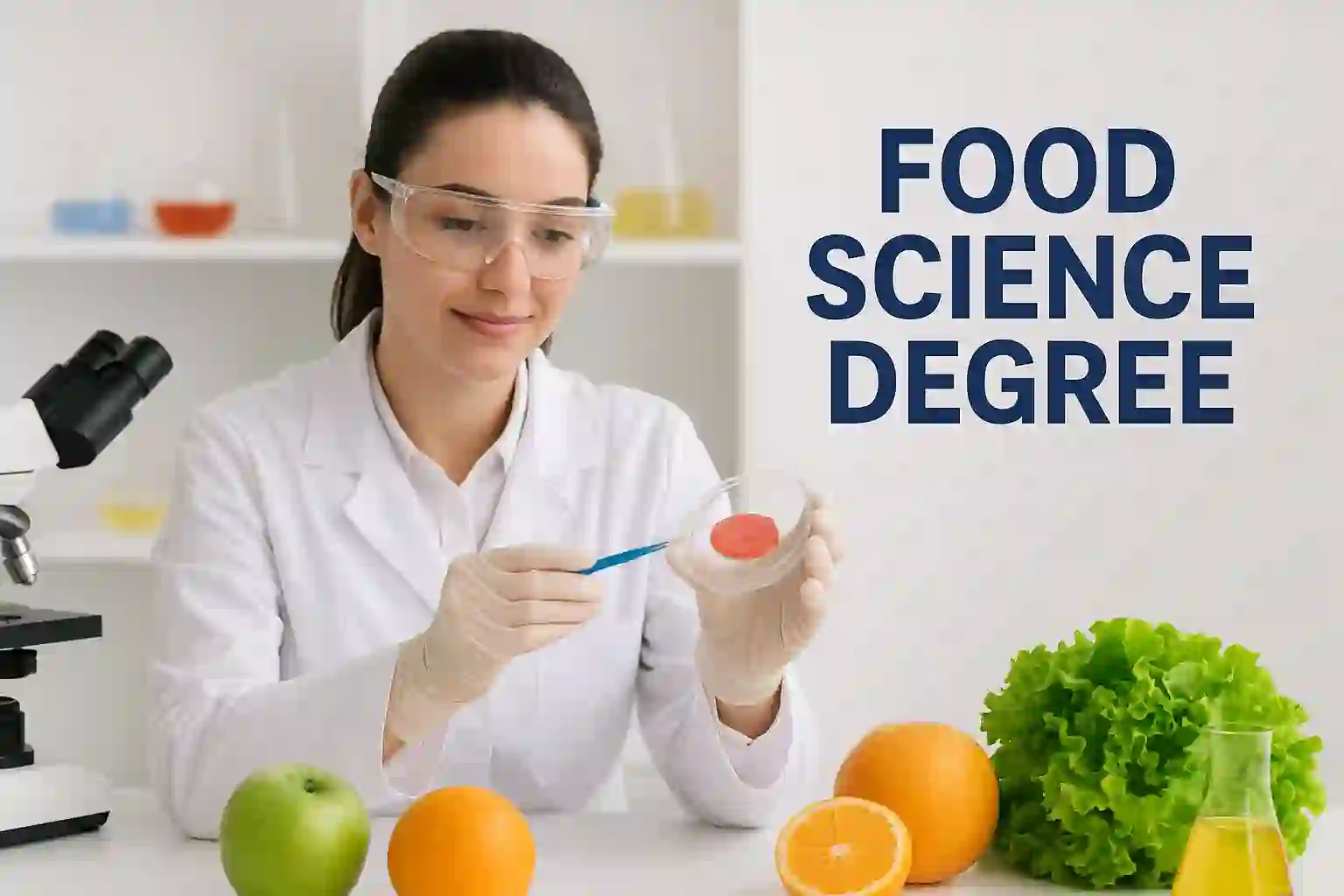Food Science Degree Online: Complete Guide for USA and Global Students

Why Food Science Matters More Than Ever?
Have you ever wondered what makes your favorite snack crunchy, how plant-based meat is created, or how food stays fresh for months? The answer lies in Food Science — a fascinating blend of chemistry, biology, nutrition, and engineering that shapes what we eat and how it reaches our tables.
In a world that’s constantly changing — from climate challenges to technological advances — food scientists are the heroes behind food safety, innovation, and sustainability.
And now, thanks to modern technology, you don’t need to attend a traditional campus to join this exciting field. You can earn a Food Science degree online — flexible, affordable, and globally recognized.
This guide will take you through everything you need to know about studying Food Science online — from what you’ll learn to where you can study, career options, and how to succeed in this rewarding field.
What Is a Food Science Degree?
Table of Contents
A Food Science degree teaches you how to apply scientific principles to food production, processing, and safety. It combines multiple disciplines such as:
- Chemistry – Understanding food composition and reactions.
- Microbiology – Studying bacteria, yeast, and microorganisms in food.
- Nutrition – Exploring the health benefits of food and ingredients.
- Engineering – Designing systems for food manufacturing and preservation.
- Statistics and Data Analysis – Ensuring consistent quality and safety.
Food science professionals work at the intersection of science, health, and business, ensuring that food is safe, nutritious, appealing, and sustainable.
Why Choose an Online Food Science Degree?
Online learning has transformed higher education. An online Food Science degree offers the same academic quality as on-campus programs, with added flexibility.
Here are some key advantages:
1. Flexibility and Convenience
Study at your own pace — whether you’re a working professional, parent, or international student. Online learning fits your schedule.
2. Cost-Effectiveness
You save on commuting, housing, and campus fees. Many universities also offer lower tuition rates for online programs.
3. Global Accessibility
Students from anywhere in the world can earn a degree from top U.S. universities.
4. Career Advancement
Online programs allow you to continue working while gaining credentials to move up in your career.
5. Accredited Quality
Most online programs are accredited, ensuring your degree holds the same value as a traditional one.
What You’ll Learn in an Online Food Science Program?
Online Food Science programs are comprehensive and career-oriented. They typically include both theoretical and practical coursework (with virtual labs or home-based experiments).
Core Subjects:
- Principles of Food Chemistry
- Food Microbiology
- Food Engineering
- Sensory Evaluation
- Nutrition Science
- Food Quality Control
- Food Safety and Regulation
- Product Development
- Food Processing Technology
Specializations (Optional):
- Food Biotechnology
- Sustainable Food Systems
- Dairy and Meat Science
- Functional Foods and Nutraceuticals
- Food Packaging and Preservation
These courses prepare you for a variety of industries — from research labs to global corporations.
Top Accredited Universities Offering Food Science Degrees Online
Here are some reputable universities offering Food Science and related degrees online for U.S. and global students:
1. University of Massachusetts Amherst – Online BS in Food Science
- Program: Bachelor’s in Food Science (Online)
- Highlights: Strong focus on food chemistry and safety.
- Accreditation: Institute of Food Technologists (IFT)
- Website: umass.edu
2. Kansas State University – Global Campus
- Program: Food Science Bachelor’s or Master’s
- Highlights: Offers both undergraduate and graduate options with virtual labs.
- Accreditation: IFT Certified
- Website: k-state.edu
3. North Carolina State University (NCSU) – Distance Education
- Program: Master of Food Science (Online)
- Highlights: Advanced program for professionals in the food industry.
- Website: ncsu.edu
4. University of Illinois Urbana-Champaign
- Program: M.S. in Food Science and Human Nutrition (Online)
- Highlights: Research-based and highly interactive.
- Website: illinois.edu
5. Arizona State University (ASU Online)
- Program: BS in Nutrition (Food and Health)
- Highlights: Combines nutrition science and food technology.
- Website: asuonline.asu.edu
How Long Does It Take to Complete a Food Science Degree Online?
The duration depends on the level of study:
- Associate Degree: 2 years
- Bachelor’s Degree: 3–4 years
- Master’s Degree: 1–2 years
- Doctorate (Ph.D.): 4–6 years
Many online programs offer accelerated tracks, allowing students to complete courses faster.
Admission Requirements
While each university sets its own criteria, most online Food Science programs require:
- High school diploma or GED (for undergraduate programs)
- Bachelor’s degree in a related field (for graduate programs)
- Minimum GPA (often 2.5–3.0)
- English proficiency (TOEFL/IELTS for international students)
- Personal statement or motivation letter
Some programs also recommend prior coursework in chemistry, biology, or mathematics.
Career Opportunities After a Food Science Degree
A Food Science degree opens doors to diverse and lucrative careers across industries such as food manufacturing, research, government, and healthcare.
Top Careers Include:
- Food Scientist / Technologist
Develop new food products and improve existing ones. - Quality Assurance Manager
Ensure food safety and compliance with regulations. - Nutrition Consultant
Advise companies and individuals on dietary health. - Food Safety Inspector
Work with government agencies to monitor food quality. - Product Development Specialist
Create innovative foods for the global market. - Sensory Analyst
Test how consumers perceive taste, texture, and aroma. - Research Scientist
Work in labs to discover new ingredients or sustainable food processes.
Salary Outlook (U.S. Averages):
- Entry-level: $55,000–$70,000/year
- Experienced professionals: $80,000–$120,000/year
- Senior roles or management: $130,000+
(Source: U.S. Bureau of Labor Statistics and PayScale 2025)
Global Demand for Food Science Professionals
Food security, nutrition, and sustainable production are global challenges. That’s why Food Science graduates are in high demand worldwide — from the USA and Canada to Europe, Australia, and Asia.
Major employers include:
- Nestlé
- PepsiCo
- Unilever
- Mondelez International
- Tyson Foods
- Danone
- FDA (U.S. Food and Drug Administration)
- USDA (U.S. Department of Agriculture)
How to Choose the Right Online Food Science Program?
Before enrolling, consider the following:
- Accreditation:
Choose a program approved by the Institute of Food Technologists (IFT) or a regional accreditation body. - Curriculum Fit:
Make sure the course content aligns with your career goals — whether in research, quality control, or nutrition. - Support and Flexibility:
Check if the program offers academic advising, tutoring, and networking opportunities. - Tuition and Financial Aid:
Compare tuition rates and explore scholarships, grants, or employer reimbursement options. - Technology and Virtual Labs:
Ensure the program includes interactive labs or simulations to gain practical experience.
Tuition Costs and Financial Aid Options
Online Food Science degree tuition can vary widely:
- Associate Degree: $10,000–$20,000 total
- Bachelor’s Degree: $30,000–$60,000 total
- Master’s Degree: $20,000–$45,000 total
Financial aid options include:
- Federal student aid (FAFSA) for U.S. students
- University scholarships
- Employer sponsorships
- Payment plans or installment options
Tips for Succeeding in an Online Food Science Program
- Stay Organized: Use planners and online calendars.
- Engage with Professors: Participate in virtual discussions.
- Build Practical Skills: Try home-based experiments or internships.
- Join Professional Associations: Like IFT or the Academy of Nutrition and Dietetics.
- Network Globally: Connect with peers and researchers online.
Future Trends in Food Science
Food science is evolving rapidly with technology and global needs. Here are the top trends shaping the industry:
- Plant-Based and Alternative Proteins
- Artificial Intelligence in Food Safety
- 3D-Printed Foods
- Sustainable Packaging Innovations
- Nutrigenomics (Personalized Nutrition)
- Food Waste Reduction Technologies
Graduates with online degrees in Food Science can lead these innovations, helping create healthier and more sustainable food systems.
Food Science Online for Free in the USA
Food Science is one of the most dynamic and essential fields of study in today’s world. It combines biology, chemistry, nutrition, and engineering to ensure food safety, improve quality, and develop innovative food products. With the growth of online learning platforms, students from anywhere can now study food science online for free — including programs offered or supported by institutions in the United States.
In this guide, we’ll explore the best free and affordable online food science degree and certificate programs, what you’ll learn, top universities, and how to get started.
Why Study Food Science Online?
Online food science programs give students the flexibility to learn from anywhere. Whether you’re in the USA or abroad, you can gain knowledge equivalent to on-campus students without paying high tuition fees.
Key benefits include:
- Study at your own pace
- Access USA-based university content from anywhere
- Gain practical and scientific food knowledge
- Earn certifications that enhance your resume
- Many courses are free or low-cost
Top Free Online Food Science Courses in the USA
Here are the best platforms and universities that offer free or affordable online food science courses:
1. edX (Harvard, MIT, Cornell, and more)
- Popular Courses:
- The Science of Gastronomy – Hong Kong University of Science and Technology
- Food Fermentation: The Science of Cooking with Microbes – Harvard University
- Cost: Free (optional paid certificate)
- Website: edx.org
2. Coursera (University of California, Stanford, and others)
- Popular Courses:
- Introduction to Food Science – University of California, Davis
- Food Sustainability and Nutrition – Stanford University
- Cost: Free to audit; small fee for certificates
- Website: coursera.org
3. FutureLearn (Open University & University of Reading)
- Popular Courses:
- Nutrition and Health: Human Microbiome
- Food Safety and Quality Management
- Cost: Free for limited access
- Website: futurelearn.com
4. OpenLearn (Open University, UK – accessible globally)
- Offers free food science and nutrition courses suitable for U.S. learners.
- Website: openlearn.open.ac.uk
5. Alison
- Popular Courses:
- Diploma in Food Safety
- Introduction to Human Nutrition
- Cost: 100% Free (optional certificate purchase)
- Website: alison.com
6. Canvas Network
- Provides free courses from U.S. universities on food technology and sustainability.
- Website: canvas.net
Accredited Online Food Science Degrees in the USA (Affordable Options)
If you’re seeking a formal degree rather than just short courses, consider these affordable online food science programs from U.S. universities:
1. Kansas State University – Online Bachelor’s in Food Science
- Accreditation: Institute of Food Technologists (IFT) approved
- Program Focus: Food microbiology, nutrition, product development
- Tuition: Around $400 per credit hour
2. University of Massachusetts Amherst – Online Food Science Courses
- Offers graduate-level food science courses and certificates
- Focus: Food processing, safety, and biochemistry
3. North Carolina State University – Distance Education in Food Science
- Programs: Certificates and continuing education
- Focus: Food microbiology, safety, and product development
4. Purdue University – Online Food Safety and Quality Graduate Certificate
- Duration: 1 year
- Perfect for: Working professionals in the food industry
What You’ll Learn in a Food Science Program?
A food science degree or online course typically covers:
- Principles of food chemistry
- Microbiology and safety standards
- Nutrition and health impact
- Product design and development
- Food processing and packaging
- Sustainability and regulatory affairs
These skills prepare you for roles such as food technologist, quality assurance specialist, or nutrition researcher.
Career Opportunities in Food Science
A degree or certificate in food science can open many career doors:
- Food Safety Inspector
- Quality Control Specialist
- Nutrition Consultant
- Product Development Scientist
- Food Technologist
- Research Analyst
Average salaries range from $55,000 to $95,000 annually in the U.S., depending on education and experience (BLS data).
How to Get Started (Step-by-Step)
- Choose your learning goal: Certificate, bachelor’s, or master’s level.
- Select a platform: edX, Coursera, Alison, etc.
- Register for free: Create an account and enroll.
- Study consistently: Set a weekly learning schedule.
- Earn your certificate: Pay only if you need official proof.
Tips for Success in Online Learning
- Keep a study journal
- Join discussion forums and food science groups
- Apply what you learn in real projects or internships
- Stay updated with new research in food technology
Food Science Degree Online Accredited
Food science is one of the fastest-growing and most innovative fields in the United States. From developing healthier food alternatives to ensuring food safety and quality, professionals in food science play a crucial role in improving what we eat and how it’s made. Today, earning a food science degree online from an accredited U.S. university is more convenient than ever.
This guide will explain what a food science degree involves, how to choose an accredited online program, the best U.S. universities offering them, career paths, tuition costs, and what you can expect to learn.
What Is Food Science?
Food science is the study of the physical, biological, and chemical makeup of food and the concepts underlying food processing and safety. It combines principles of chemistry, microbiology, nutrition, and engineering to improve food quality, shelf life, and safety.
Food scientists work in labs, manufacturing facilities, and research institutions to create new food products, enhance existing ones, and ensure compliance with safety regulations.
Why Study Food Science Online?
Online education offers flexibility for working adults, parents, or those living far from campus. By choosing an online accredited food science degree, you can:
- Learn from top U.S. universities from anywhere in the world
- Maintain your job while studying part-time or full-time
- Access virtual labs, interactive assignments, and real-world case studies
- Graduate with the same recognized degree as on-campus students
Accreditation: Why It Matters
When choosing an online food science program, accreditation is crucial. Accredited universities meet high educational standards set by regional or national bodies.
Key Accreditation Bodies in the USA:
- Higher Learning Commission (HLC)
- Middle States Commission on Higher Education (MSCHE)
- Southern Association of Colleges and Schools Commission on Colleges (SACSCOC)
- Institute of Food Technologists (IFT) — offers programmatic accreditation specifically for food science programs
Choosing an IFT-approved program ensures your degree is recognized by employers and meets industry standards.
Top Accredited Online Food Science Degree Programs in the USA
Below are some of the best accredited universities offering food science degrees online:
1. Kansas State University – Online B.S. in Food Science and Industry
- Accreditation: Higher Learning Commission, IFT-approved
- Highlights: Covers food chemistry, microbiology, safety, and product development. Offers internship and research opportunities.
- Format: Fully online
2. University of Massachusetts Amherst – Online Food Science Courses & Certificates
- Accreditation: NECHE
- Highlights: Offers online professional certificates and continuing education in food safety and food technology. Ideal for working professionals.
3. Washington State University – Online B.S. in Food Science
- Accreditation: NWCCU, IFT-approved
- Highlights: Focus on food processing, sensory evaluation, and sustainable practices.
4. Colorado State University Global – Online Bachelor’s in Nutrition and Food Science
- Accreditation: HLC
- Highlights: Combines nutrition, chemistry, and food production systems. Flexible self-paced learning.
5. Ohio State University – Online M.S. in Food Science and Technology
- Accreditation: HLC
- Highlights: Ideal for advanced learners or professionals seeking research and leadership roles in food industries.
What You’ll Learn in a Food Science Degree Program
Online food science degrees cover a wide range of topics combining science and applied food technology.
Core Subjects Include:
- Food Chemistry
- Food Microbiology and Safety
- Food Engineering and Processing
- Nutrition and Public Health
- Sensory Analysis
- Food Packaging and Preservation
- Quality Control and Regulation
You may also take electives in:
- Sustainable food systems
- Plant-based food innovation
- Biotechnology in food production
Admission Requirements
Admission criteria vary by university but typically include:
- High school diploma (for bachelor’s) or bachelor’s degree (for master’s)
- Minimum GPA (often 2.5–3.0)
- Official transcripts
- Personal statement or essay
- Letters of recommendation (for graduate programs)
- English proficiency (for international students)
Career Opportunities with a Food Science Degree
A food science degree opens doors to numerous high-demand careers in the U.S. and worldwide.
Common Career Paths:
- Food Scientist / Technologist
- Quality Assurance Manager
- Food Product Developer
- Regulatory Affairs Specialist
- Nutritionist or Dietitian
- Food Safety Inspector
- Research and Development Specialist
Top Employers Include:
- PepsiCo
- Nestlé
- Kraft Heinz
- Tyson Foods
- USDA & FDA
- Research labs and universities
Salary Outlook:
According to the U.S. Bureau of Labor Statistics (BLS), the median salary for food scientists is around $78,700 per year, with top professionals earning over $120,000 annually.
Tuition and Financial Aid
Tuition for online food science programs typically ranges from $350–$700 per credit hour. A full bachelor’s degree may cost between $35,000–$60,000, depending on the university.
Most accredited U.S. universities offer:
- Federal financial aid (FAFSA eligible)
- Scholarships and grants
- Employer tuition reimbursement programs
Benefits of Earning a Food Science Degree Online
Flexibility: Study at your own pace from anywhere.
Affordability: Save on housing and commuting costs.
Accreditation: Same degree and credibility as on-campus programs.
Career Advancement: Gain qualifications for high-paying food industry jobs.
Global Opportunities: Accredited U.S. degrees are recognized internationally.
Tips for Choosing the Right Online Food Science Program
- Check Accreditation: Regional or IFT accreditation is a must.
- Review Curriculum: Ensure it includes both scientific and practical aspects.
- Look for Internships: Real-world experience adds value.
- Compare Tuition: Evaluate cost vs. benefits.
- Read Student Reviews: Insight into course quality and support services.
A Food Science Degree Online (Accredited in the USA) offers a powerful combination of flexibility, scientific expertise, and global career potential. Whether you aim to work in food product development, quality control, or nutrition, earning this degree from a reputable U.S. institution can open doors to exciting opportunities in the ever-evolving food industry.
If you’re passionate about food innovation, health, and technology, now is the time to start your journey toward an accredited online food science degree.
Food Science Degree Requirements
Food is one of humanity’s greatest needs — but ensuring it’s safe, nutritious, and sustainable requires scientific expertise. That’s where Food Science comes in. A degree in Food Science equips students with the knowledge to understand the biological, chemical, and physical makeup of food — and how to process, preserve, and innovate it for the world’s growing population.
If you’re passionate about nutrition, chemistry, and innovation, pursuing a Food Science degree can open doors to diverse careers in research, manufacturing, quality assurance, and product development. But before you enroll, it’s essential to understand the requirements — from admission prerequisites to coursework, laboratory experience, and graduation expectations.
This comprehensive guide explains Food Science degree requirements worldwide, including top universities, course structures, and career paths.
Overview of a Food Science Degree
A Food Science degree blends disciplines like biology, chemistry, engineering, and nutrition. Students learn how to analyze food components, develop safe production methods, and innovate new food products that meet regulatory and consumer standards.
Degree levels available:
- Bachelor’s in Food Science (BSc or BS)
- Master’s in Food Science (MSc or MS)
- Doctorate (PhD) in Food Science or Food Technology
These programs are offered globally, with strong representation in the United States, United Kingdom, Canada, Australia, and parts of Europe and Asia.
1. Admission Requirements
A. For Bachelor’s in Food Science
To enroll in a Bachelor’s degree, students must meet general university entrance and science prerequisites.
Typical Requirements (Global Standards):
- High school diploma or equivalent (A-Levels, IB, etc.)
- Strong foundation in science and mathematics, including:
- Biology
- Chemistry
- Mathematics (Algebra, Statistics, or Calculus)
- Physics (recommended)
- Minimum GPA / Marks:
- USA: 2.5–3.0 GPA (on a 4.0 scale)
- UK: A-level grades of BBC–ABB
- Canada: 70–80% average
- Australia: ATAR score 70+
- Language proficiency:
- IELTS 6.0–7.0
- TOEFL iBT 79–100
- Duolingo 110+ (for international applicants)
Documents Required:
- Official transcripts
- Personal statement or essay
- Letters of recommendation (optional)
- Passport copy (for international students)
B. For Master’s in Food Science
Graduate admission requirements are more specific and research-oriented.
Typical Requirements:
- Bachelor’s degree in Food Science, Nutrition, Biology, Chemistry, or Engineering
- Minimum GPA: 3.0 (U.S.) or equivalent
- GRE or GMAT scores: Optional or required (depending on the country)
- Statement of purpose (SOP): Describing career goals and research interests
- 2–3 academic references
- English proficiency: IELTS 6.5+ or TOEFL iBT 90+
Preferred Backgrounds:
Students with experience or undergraduate majors in:
- Chemistry or Biochemistry
- Microbiology
- Agricultural or Food Engineering
- Nutrition and Dietetics
C. For PhD in Food Science
Doctoral programs are designed for advanced research and innovation.
Typical PhD entry requirements:
- Master’s degree in Food Science or related field
- Research proposal or statement of intent
- CV/resume highlighting academic or industry experience
- Faculty supervisor approval
- English proficiency proof (if applicable)
2. Core Curriculum and Coursework
Food Science degrees balance theory, lab work, and industry practice. While curricula differ by region, most programs cover common scientific foundations.
Undergraduate Coursework (BSc/BS)
| Core Category | Example Courses |
|---|---|
| Basic Sciences | General Biology, Chemistry I & II, Organic Chemistry |
| Food Chemistry | Composition and Properties of Food, Food Additives |
| Food Microbiology | Microbial Safety, Fermentation, Pathogens |
| Nutrition | Human Nutrition, Nutritional Biochemistry |
| Processing & Preservation | Food Engineering, Unit Operations, Food Packaging |
| Safety & Quality Assurance | HACCP, Food Laws & Regulations, Sensory Evaluation |
| Mathematics & Data | Statistics, Experimental Design |
| Capstone Project | Product Development, Internship, or Research Project |
Graduate Coursework (MSc/MS)
Master’s students focus on specialization and research.
| Area | Example Graduate Courses |
|---|---|
| Advanced Food Chemistry | Carbohydrates, Lipids, and Protein Functionality |
| Food Biotechnology | Enzyme Technology, Genetic Engineering |
| Food Toxicology | Contaminants, Risk Assessment |
| Product Innovation | Sensory Science, Consumer Behavior |
| Research Methods | Data Analytics, Experimental Design |
| Electives | Sustainability in Food, Functional Foods, Supply Chain Management |
Thesis or Non-thesis option:
- Thesis-based: Focus on original research.
- Coursework-based: Emphasizes applied skills and professional practice.
3. Laboratory and Internship Requirements
Food Science education is highly hands-on.
Laboratory Requirements
Students conduct experiments in:
- Food microbiology labs
- Chemistry and analysis labs
- Quality control simulations
- Product development kitchens
Internships
- Typically 3–6 months with food companies, research institutions, or government agencies.
- Roles include quality assurance, R&D, or food safety monitoring.
Capstone Project
Most programs end with a capstone or final-year project, where students design and test a new product — integrating chemistry, nutrition, and sensory science.
4. Skills Developed in a Food Science Degree
Graduates develop both scientific and managerial skills applicable to various industries.
Technical Skills
- Laboratory research and analysis
- Microbial testing and food safety assessment
- Product formulation and sensory testing
- Statistical and data interpretation
- Use of analytical instruments (GC, HPLC, etc.)
Soft & Professional Skills
- Problem-solving and critical thinking
- Communication and teamwork
- Project and quality management
- Awareness of international food laws and regulations
5. Accreditation and Recognition
Accreditation ensures your Food Science degree meets academic and professional standards.
United States
- Institute of Food Technologists (IFT) accreditation
- Regional accreditation by CHEA-recognized agencies
United Kingdom
- Institute of Food Science & Technology (IFST) accreditation
- Quality assurance via OfS and QAA
Canada
- Accredited by Universities Canada and recognized by Canadian Institute of Food Science and Technology (CIFST)
Australia
- Accreditation through Institute of Food Technologists (IFT) and Engineers Australia (for Food Engineering programs)
These accreditations help graduates qualify for global employment and advanced studies.
6. Global University Highlights
🇺🇸 Top U.S. Universities
- University of California, Davis
- Cornell University
- Purdue University
- University of Illinois Urbana-Champaign
- Texas A&M University
🇬🇧 Top UK Universities
- University of Leeds
- University of Nottingham
- University of Reading
- Queen’s University Belfast
🇨🇦 Top Canadian Universities
- University of Guelph
- McGill University
- University of British Columbia
🇦🇺 Top Australian Universities
- University of Queensland
- Curtin University
- RMIT University
Asian & European Leaders
- Wageningen University (Netherlands)
- National University of Singapore (NUS)
- Seoul National University (South Korea)
7. Duration and Credit Requirements
| Degree Level | Duration | Credits / Units | Key Component |
|---|---|---|---|
| Bachelor’s (BSc/BS) | 3–4 years | 120–128 credits | Internship or Capstone Project |
| Master’s (MSc/MS) | 1.5–2 years | 30–60 credits | Thesis or Applied Project |
| PhD | 3–5 years | Variable | Dissertation Research |
8. Career Opportunities After Graduation
Graduates are in demand across industries due to the increasing need for food safety, innovation, and sustainability.
Popular Job Titles
- Food Scientist or Technologist
- Quality Assurance Manager
- Product Development Scientist
- Food Microbiologist
- Regulatory Affairs Specialist
- Nutrition Consultant
- Food Safety Inspector
Employers
- Food manufacturing companies (Nestlé, PepsiCo, Unilever)
- Government agencies (FDA, USDA, EFSA)
- Research institutions and universities
- Public health organizations and NGOs
9. Average Salary by Country
| Country | Entry-Level | Experienced | Notes |
|---|---|---|---|
| United States | $55,000–$70,000 | $90,000+ | (BLS, 2024) |
| United Kingdom | £25,000–£40,000 | £55,000+ | (IFST Data) |
| Canada | CAD 50,000–80,000 | CAD 100,000+ | (Job Bank Canada) |
| Australia | AUD 65,000–95,000 | AUD 120,000+ | (Seek Data 2024) |
| Asia/Europe (Avg.) | €35,000–€70,000 | €90,000+ | (EU Skills Reports) |
Salaries depend on experience, education level, and industry specialization.
10. Graduation Requirements
To graduate, students must complete:
Bachelor’s Level
- 120+ academic credits
- Minimum GPA (2.0–2.5 or regional equivalent)
- Successful completion of internships and projects
Master’s Level
- 30–60 graduate-level credits
- Research thesis or applied project
- GPA of 3.0+
Doctoral Level
- Dissertation defense and publication of findings
- Conference presentation or academic contribution
11. Why Study Food Science?
Food Science is one of the most impactful and versatile degrees in the modern world. It combines science, innovation, and sustainability — addressing global challenges like food security and nutrition.
Top Reasons to Study Food Science
- Global job demand in food safety and sustainability
- High employability across industries
- Opportunities for international research and travel
- Ability to influence public health and policy
- Competitive salaries and career growth
12. Future Trends in Food Science Education
The food industry is evolving rapidly, and universities are updating curricula to match new technologies and trends.
Emerging Study Areas
- Sustainable Food Systems
- Plant-Based and Alternative Proteins
- Food Biotechnology and Genomics
- AI and Data Analytics in Food Production
- Nutrigenomics and Personalized Nutrition
Graduates who understand these innovations will be positioned for leadership roles in global food industries.
13. Summary: Key Takeaways
| Category | Requirements |
|---|---|
| Entry Prerequisites | High school or bachelor’s in science field |
| Core Subjects | Chemistry, Microbiology, Nutrition, Engineering |
| Skills Gained | Lab research, safety, product development |
| Internship | Mandatory (3–6 months) |
| Degree Duration | 3–4 years (BSc), 1–2 years (MSc), 3–5 years (PhD) |
| Accreditation | IFT, IFST, CIFST, national bodies |
| Career Paths | Food Scientist, QA Manager, Researcher, Technologist |
A Food Science degree offers more than just academic achievement — it’s a gateway to making global change. By understanding how food affects human health, safety, and sustainability, graduates become part of an essential scientific movement shaping the future of what we eat.
Whether you study in the U.S., UK, Canada, Australia, or anywhere worldwide, Food Science provides the perfect balance of science, innovation, and real-world impact.
With the right education, skills, and passion, you can play a vital role in feeding the world safely and sustainably.
Frequently Asked Questions (FAQs)
Can you get a Food Science degree completely online?
Yes. Many accredited universities in the U.S. offer fully online Food Science and Nutrition degrees, with virtual labs and interactive coursework.
Are online Food Science degrees respected by employers?
Absolutely. Accredited online degrees hold the same credibility as on-campus programs, especially when accredited by the IFT or regional bodies.
What are the best online universities for Food Science?
Top picks include the University of Massachusetts Amherst, Kansas State University, and North Carolina State University.
What kind of jobs can I get with this degree?
Careers include food technologist, nutritionist, quality control analyst, food safety manager, and research scientist.
Is Food Science a good career choice?
Yes! It offers strong job security, good pay, and the chance to contribute to public health and global sustainability.
Earning a Food Science degree online is one of the smartest choices for today’s students. It offers flexibility, affordability, and access to one of the fastest-growing fields in the world.
Whether you want to develop healthier foods, ensure global food safety, or lead research in sustainability, an online Food Science degree empowers you to make an impact — from your kitchen to the world stage.
So, take the next step — explore programs, enroll in the one that fits your goals, and start shaping the future of food today.
>> Hospital Management Degree: A Complete Guide to Careers, Curriculum, and Opportunities in the U.S.
>> Associate’s of Biology Degree General Studies Requirements: A Complete Guide



